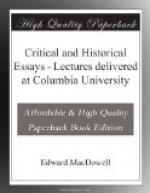Haendel, as before stated, was born in 1685 (February 23), in Halle, in the same year as J.S. Bach, who was a month younger (born March 21). His father was a barber, who, as was common in those days, combined the trade of surgery, cupping, etc., with that of hairdressing. He naturally opposed his son’s bent toward music, but with no effect. At fifteen years of age, Haendel was beginning to be well known as a clavichord and organ player, in the latter capacity becoming specially celebrated for his wonderful improvisations. In spite of an attempt to make a lawyer of him, he persisted in taking music as his vocation, after the death of his father.
In Hamburg, whither he went in 1703, he obtained a place among the second violins in the opera orchestra.[15] Realizing that in Germany opera was but a reflection of Italian art, he left Hamburg in 1707 and went to Italy, where he soon began to make a name for himself, both as performer and composer. One of his operas, “Agrippa,” was performed at Venice during the Carnival season of 1710.
The Hanoverian kapellmeister, Staffani, was present and invited him to Hanover, whither he went, becoming Staffani’s successor in the service of the Elector of Hanover. Several trips to England, where he was warmly welcomed, resulted in his accepting from Queen Anne, in 1713, a salary of two hundred pounds yearly, thus entering her service, notwithstanding his contract with the Elector. In 1714 the Queen died, and the Elector of Hanover was called to the English throne under the title of George I. Haendel, in order to escape the impending disgrace occasioned by having broken faith with his former employer, wrote some music intended to be particularly persuasive, and had it played on a barge that followed a royal procession up the Thames. This “Water Music,” as it was called, procured for him the King’s pardon.
From this time he lived in England, practically monopolizing all that was done in music. In 1720 a company for the giving of Italian opera was formed, and Haendel placed at its head. In 1727, on the occasion of the accession of George II, Haendel wrote four anthems, one of which “Zadok the Priest,” ends with the words “God save the King,” from which it has been erroneously stated that he wrote the English national hymn.
In 1737 Haendel gave up the writing of operas, after sinking most of his own savings in the undertaking, and began to write oratorios, the germs of which are found in the old Mysteries and Passion plays performed on a platform erected in the chapel or oratory of a church. Much has been written about Haendel’s habit of taking themes from other composers, and he was even dubbed the “grand old robber.” It must not be overlooked, however, that although he made use of ideas from other composers, he turned them to the best account. By 1742 Haendel was again in prosperous circumstances, his “Messiah” having been a tremendous success. From that time




